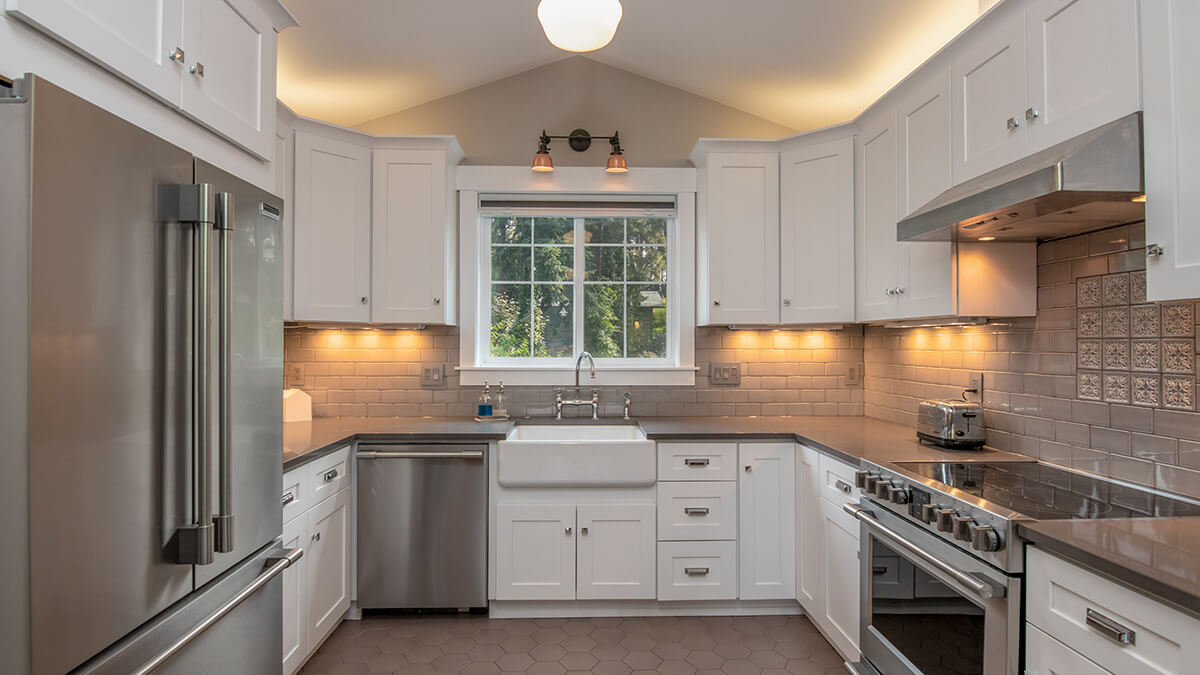Deciding whether to remodel your house before selling can be tricky. Many homeowners wrestle with questions like, “Will this renovation pay off?” or “Should I just sell as-is?” The truth is, every situation is different, and the answer depends on your home’s condition, the market, and your goals.
For those who want to skip the stress of remodeling altogether, iBuyer.com offers a game-changing solution. They buy homes quickly, in any condition, letting you avoid expensive renovations and get on with your plans faster.
Compare Cash Offers from Top Home Buyers. Delivered by Your Local iBuyer Certified Specialist.
One Expert, Multiple Offers, No Obligation.
Remodel Before Selling
Assessing the Need for Remodeling Before Selling
When deciding whether to remodel, it’s essential to take a step back and evaluate your situation thoroughly. Here’s how to start:
Evaluating Your Home’s Current Condition
Walk through your home with a critical eye, noting areas that show wear or might deter buyers. Look for:
- Peeling paint, damaged floors, or outdated fixtures.
- Functional issues like leaky faucets, drafty windows, or aging appliances.
- Structural concerns such as cracks in the walls or roof damage.
Consider hiring a professional inspector to get a comprehensive list of repairs. Knowing your home’s condition helps you focus on necessary updates instead of guesswork.
Understanding the Local Real Estate Market
Research what buyers in your area expect. Visit open houses or browse online listings of comparable homes. Pay attention to:
- Features that are standard in similar homes, like modern kitchens or updated bathrooms.
- The selling price of homes in pristine condition versus fixer-uppers.
This research ensures you’re not over-investing in upgrades buyers won’t pay a premium for.
Budget Considerations
Once you know what needs improvement, set a realistic budget. Ask yourself:
- Can you afford to make these changes without financial strain?
- Are the potential renovations likely to increase your home’s value enough to offset the costs?
Sometimes, a limited budget can be better spent on smaller, high-impact updates rather than extensive renovations. And if funds are tight, selling as-is to iBuyer.com may be a better choice, saving you time and money.
High-ROI Renovations to Consider
If you decide to remodel before selling, focus on updates that give the most bang for your buck. Here are some improvements that often deliver a strong return on investment (ROI) and attract more buyers.
Enhancing Curb Appeal
First impressions matter! Boosting your home’s curb appeal can significantly impact buyers’ interest.
- Landscaping: A well-maintained lawn, fresh mulch, and colorful plants can make your home feel inviting.
- Exterior Painting: A fresh coat of paint, especially in neutral colors, can instantly modernize your home.
- Front Door Updates: Replacing or painting your front door and adding stylish hardware gives your entrance a welcoming vibe.
These small changes often make a big difference and are relatively inexpensive.
Minor Kitchen and Bathroom Updates
Kitchens and bathrooms sell homes, but you don’t need a complete overhaul to impress buyers.
- Upgrade Fixtures: Swap outdated faucets, cabinet handles, and light fixtures for modern designs.
- Fresh Paint: Repainting cabinets and walls in light, neutral tones can make the space feel larger and brighter.
- Replace Appliances: Consider upgrading old appliances to stainless steel or energy-efficient models if your budget allows.
These upgrades can make these key spaces feel refreshed without breaking the bank.
Basic Repairs and Maintenance
Don’t underestimate the value of a well-maintained home. Addressing small repairs reassures buyers your home is cared for.
- Fix leaky faucets and squeaky doors.
- Repair any cracks in walls or ceilings.
- Ensure HVAC, plumbing, and electrical systems are in good working order.
A home in good condition is more appealing than one that shows signs of neglect, even if it’s outdated.
Renovations That May Not Pay Off
Not all home improvements yield a good return on investment. In fact, some updates can drain your wallet without boosting your home’s value or appeal to buyers. Here’s what to avoid:
Major Remodels with Low ROI
Extensive remodels often cost more than they return in added value. Examples include:
- Complete Kitchen Overhauls: Tearing everything out and starting fresh is expensive and may not appeal to every buyer.
- Luxury Bathroom Additions: High-end finishes like spa tubs or custom vanities are costly and rarely recover their full value.
These large-scale projects often end up being more about personal preference than widespread buyer appeal.
Highly Personalized Upgrades
While it’s tempting to tailor your home to your tastes, personalizing too much can alienate potential buyers.
- Bold Color Choices: Bright, unconventional colors might require buyers to repaint, which could turn them off.
- Custom Features: Unique items like built-in aquariums, themed rooms, or hobby-specific spaces might not align with buyers’ needs.
Keep updates neutral and functional to appeal to the widest audience possible.
Over-Improving for the Neighborhood
Spending on upgrades that far outpace the average for your area can be a losing battle.
- For example, adding a luxury outdoor kitchen in a modest neighborhood might not attract buyers willing to pay extra for it.
- Buyers often look for homes priced in line with the area, not ones with features they’ll never use.
If your goal is to sell quickly and avoid unnecessary costs, skipping these kinds of upgrades is often the smartest choice.
Alternative Solutions to Boost Appeal
If remodeling doesn’t fit your budget or timeline, there are still effective ways to make your home more attractive to buyers. These cost-friendly strategies can enhance your home’s appeal without the need for major renovations.
Professional Home Staging
Staging helps potential buyers envision themselves living in your home. Key benefits include:
- Maximizing Space: Rearranging furniture creates a more open and welcoming flow.
- Showcasing Potential: Stagers highlight your home’s best features with strategically placed décor.
- Neutralizing Style: By depersonalizing spaces, staging helps appeal to a broader range of buyers.
Hiring a professional stager or using virtual staging tools can make your home stand out in online listings and during showings.
Deep Cleaning and Decluttering
A clean, clutter-free home leaves a positive impression and costs very little.
- Deep Clean Everything: Scrub floors, walls, and fixtures until they shine.
- Organize Closets and Storage Spaces: Buyers often peek into storage areas, so keep them tidy and spacious.
- Remove Personal Items: Pack away family photos, collectibles, and other personal touches to create a neutral space.
A sparkling home not only looks better but also signals to buyers that it’s been well cared for.
Minor Cosmetic Touch-Ups
Small, affordable changes can have a big impact.
- Fresh Paint: A coat of neutral paint can instantly refresh walls and make rooms look brighter.
- Lighting Upgrades: Replace dim or outdated light fixtures with modern, energy-efficient options.
- Simple Décor Updates: Add new throw pillows, rugs, or curtains to bring in a modern look.
These updates are low-cost ways to enhance your home’s appeal and help buyers see its potential.
Reilly’s Two Cents
Drawing on years of experience in real estate, I’ve learned that selling a home doesn’t always mean breaking the bank on renovations. With a few strategic moves, you can maximize your home’s appeal without draining your resources. Here’s what I recommend:
Prioritize Cost-Effective Improvements
Not all updates need to be pricey to make an impact. Focus on upgrades that deliver visible results:
- Fresh Paint and Minor Repairs: These quick fixes can make your home feel newer without a big expense.
- Curb Appeal Enhancements: Even small landscaping changes or a new mailbox can boost the first impression.
These small investments often lead to better offers without the need for a full-scale remodel.
Consult with Real Estate Professionals
Leverage the expertise of agents or local market specialists to identify smart improvements:
- They can help you pinpoint the updates buyers in your area value most.
- Their advice ensures your budget is spent strategically rather than on unnecessary upgrades.
Many agents even have stagers and contractors in their network who can work efficiently and cost-effectively.
Consider Buyer Incentives
Instead of remodeling, you might offer incentives that let buyers customize the home to their taste:
- Credits for Repairs or Updates: Offering a credit towards renovations lets buyers envision changes they prefer.
- Flexible Closing Terms: Accommodating a buyer’s timeline can make your home more appealing.
These approaches save you the hassle of remodeling while still closing the sale smoothly.
Conclusion
Deciding whether to remodel before selling your house is a personal choice that depends on your budget, timeline, and the current market. While renovations can enhance your home’s value and attract buyers, they aren’t always necessary—or the most cost-effective option.
Instead of pouring time and money into uncertain upgrades, consider alternative solutions like staging, decluttering, and offering buyer incentives. These strategies can help sell your home faster without the stress of remodeling.
For homeowners looking for an even simpler path, iBuyer.com offers a hassle-free solution. You can sell your home as-is, avoid the expense of renovations, and move on to your next chapter quickly and confidently. With iBuyer.com, you’re in control—no repairs, no waiting, just results.
Instant Valuation, Confidential Deals with a Certified iBuyer.com Specialist.
Sell Smart, Sell Fast, Get Sold. No Obligations.
FAQ
Not always. Whether to remodel depends on your home’s condition, the expectations of buyers in your area, and your financial situation. Sometimes minor updates or alternative strategies, like staging, are enough.
High-ROI updates include enhancing curb appeal, making minor kitchen and bathroom improvements, and addressing basic repairs. These tend to boost a home’s appeal without excessive cost.
Yes, you can! Companies like iBuyer.com specialize in buying homes as-is. This allows you to skip the renovation process entirely and sell your home quickly.
Consult with a local real estate professional. They can provide insights into what buyers in your area prioritize and help you focus on improvements that align with your budget and goals.
Simple updates like deep cleaning, decluttering, adding fresh paint, and replacing outdated fixtures can go a long way in improving your home’s marketability without a hefty price tag.
Reilly Dzurick is a seasoned real estate agent at Get Land Florida, bringing over six years of industry experience to the vibrant Vero Beach market. She is known for her deep understanding of local real estate trends and her dedication to helping clients find their dream properties. Reilly’s journey in real estate is complemented by her academic background in Public Relations, Advertising, and Applied Communication from the University of North Florida.




